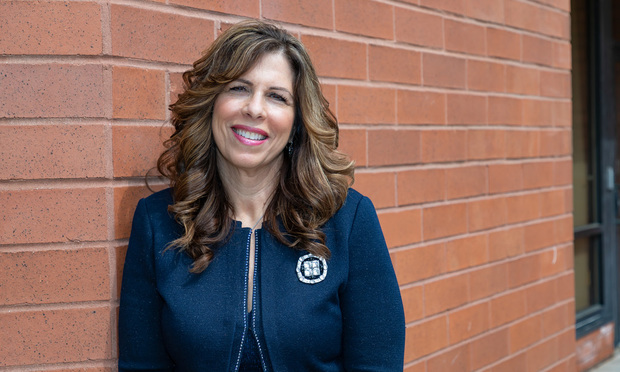Robin Kay Lord, Out of the 'Trenches,' Breaks Ground for Same-Sex Couples in 2018 Appeal
"It's an entirely different animal in the Appellate Division," Lord said. "When I'm up there I sort of feel like a fish out of water sometimes. ... Usually I'm in the trenches."
June 07, 2019 at 03:00 PM
5 minute read
 Robin Kay Lord of Trenton / Photo by Carmen Natale/ALM
Robin Kay Lord of Trenton / Photo by Carmen Natale/ALM
Robin Kay Lord of Trenton is known for her accomplishments as a criminal defense trial attorney, but she also represented the plaintiffs in Moreland v. Parks, which in 2018 yielded an Appellate Division ruling that recognized a same-sex spouse's right to pursue a Portee claim.
“The Morelands came to us 10 years ago,” Lord said in an interview. “It was a horrific case.”
Indeed it was, involving the death of 2-year-old I'Maya Moreland of Trenton. The girl was the biological daughter of plaintiff I'Asia Moreland, who lived with fellow plaintiff Valeria Benning as a married couple in a household that included l'Maya. The Jan. 30, 2009, accident happened as Moreland, Benning, l'Maya, sibling I'Zhir Moreland and stepson Armanti Martinez were waiting to cross Route 129 in Trenton to get to the Sun Bank Arts Center. Benning was holding I'Maya Moreland's hand when a city firetruck collided with a pickup truck, which struck Moreland, propelling her 65 feet from the accident site. She died as the result of her injuries.
Mercer County Superior Court Judge William Anklowitz, granting summary judgment, said Benning had not developed a sufficient emotional and familial relationship with I'Maya to support a claim under Portee v. Jaffe, a 1980 Supreme Court ruling which allows recovery for bystander negligent infliction of emotional distress for family members.
“When we did summary judgment, there were so many issues before the trial court,” Lord said, and when the court ruled on the Portee issue, “I thought I was in an alternate universe, I didn't believe it,” she said.
During the January 2018 arguments, the Appellate Division asked why the record was sparse on evidence demonstrating family ties between Benning and l'Maya, Lord recalled.
“I said, because it was obvious” that they were part of a family, having lived together for years, and Benning being known as “mom” to the children, she said.
The court, led by Appellate Division Judge Jose Fuentes in August 2018 reversed, noting that same-sex couples weren't recognized when Portee came down decades ago, but, “the overwhelming number of our fellow citizens now unequivocally reject this shameful, morally untenable bigotry; our laws, both legislatively and through judicial decisions, now recognize and protect the rights of LGBTQ people to equal dignity and treatment under law.”
“A rational jury can find that Benning was a de facto mother to the child, and felt her loss as deeply as any parent facing that horrific event,” Fuentes wrote, joined by Judges Thomas Manahan and Karen Suter.
The case is ongoing, as the plaintiffs settled with the city of Trenton, and dismissal of claims against other defendants were appealed, Lord said.
Lord does 90 percent criminal work, so Moreland was something of a special case for her.
And while Lord does have plenty of experience with appellate arguments—including in State v. Mercedes, which she argued before the state Supreme Court, and which in 2018 garnered a decision holding that “a recommendation against a defendant's pretrial release that is based only on the type of offense charged cannot justify detention by itself unless the recommendation is based on one of two presumptions in the statute”—appeals are not the typical fare for her.
“It's an entirely different animal in the Appellate Division,” said Lord, who acknowledged being “nervous every time” she argues a case on appeal. “When I'm up there, I sort of feel like a fish out of water sometimes. … Usually I'm in the trenches.”
She was in the trenches in October 2018 when she obtained a trial acquittal of Mario Flores, who was charged in the shooting death of his wife. The evidence pointed to the death being a suicide, she said.
“If you think your client is truly, truly, truly innocent, the pressure is tremendous,” Lord said of that case.
The civil work she does is typically in civil rights litigation against the city and city police on behalf of arrestees, though earlier this year she obtained an $850,000 settlement on behalf of the family of a motorcyclist, Julius Thomas, killed in a crash along what was alleged to be a dangerous stretch of road in the city.
As a known entity in Trenton, various types of cases—not just the criminal cases on which she built her career—make their way to her, said Lord, a former longtime assistant public defender who launched her own practice in 1996.
“I was fortunate enough to land in Trenton in the 80s,” when newspaper competition was particularly intense and she made a name for herself appearing in the news. “When something horrific happens, I'm one of the people they call.”
Even horrific cases, though, can yield positive results. Lord said she's pleased that the Appellate Division's decision in Moreland was heralded by so many.
“I was delighted to know how much attention in received,” Lord said. “Hopefully it will help.”
This content has been archived. It is available through our partners, LexisNexis® and Bloomberg Law.
To view this content, please continue to their sites.
Not a Lexis Subscriber?
Subscribe Now
Not a Bloomberg Law Subscriber?
Subscribe Now
NOT FOR REPRINT
© 2025 ALM Global, LLC, All Rights Reserved. Request academic re-use from www.copyright.com. All other uses, submit a request to [email protected]. For more information visit Asset & Logo Licensing.
You Might Like
View All
Was $1.3M in 'Incentive' Payments Commission? NJ Justices Weigh Arguments
3 minute read
Law Firms Look to Gen Z for AI Skills, as 'Data Becomes the Oil of Legal'

Trending Stories
- 1Public Notices/Calendars
- 2Wednesday Newspaper
- 3Decision of the Day: Qui Tam Relators Do Not Plausibly Claim Firm Avoided Tax Obligations Through Visa Applications, Circuit Finds
- 4Judicial Ethics Opinion 24-116
- 5Big Law Firms Sheppard Mullin, Morgan Lewis and Baker Botts Add Partners in Houston
Who Got The Work
J. Brugh Lower of Gibbons has entered an appearance for industrial equipment supplier Devco Corporation in a pending trademark infringement lawsuit. The suit, accusing the defendant of selling knock-off Graco products, was filed Dec. 18 in New Jersey District Court by Rivkin Radler on behalf of Graco Inc. and Graco Minnesota. The case, assigned to U.S. District Judge Zahid N. Quraishi, is 3:24-cv-11294, Graco Inc. et al v. Devco Corporation.
Who Got The Work
Rebecca Maller-Stein and Kent A. Yalowitz of Arnold & Porter Kaye Scholer have entered their appearances for Hanaco Venture Capital and its executives, Lior Prosor and David Frankel, in a pending securities lawsuit. The action, filed on Dec. 24 in New York Southern District Court by Zell, Aron & Co. on behalf of Goldeneye Advisors, accuses the defendants of negligently and fraudulently managing the plaintiff's $1 million investment. The case, assigned to U.S. District Judge Vernon S. Broderick, is 1:24-cv-09918, Goldeneye Advisors, LLC v. Hanaco Venture Capital, Ltd. et al.
Who Got The Work
Attorneys from A&O Shearman has stepped in as defense counsel for Toronto-Dominion Bank and other defendants in a pending securities class action. The suit, filed Dec. 11 in New York Southern District Court by Bleichmar Fonti & Auld, accuses the defendants of concealing the bank's 'pervasive' deficiencies in regards to its compliance with the Bank Secrecy Act and the quality of its anti-money laundering controls. The case, assigned to U.S. District Judge Arun Subramanian, is 1:24-cv-09445, Gonzalez v. The Toronto-Dominion Bank et al.
Who Got The Work
Crown Castle International, a Pennsylvania company providing shared communications infrastructure, has turned to Luke D. Wolf of Gordon Rees Scully Mansukhani to fend off a pending breach-of-contract lawsuit. The court action, filed Nov. 25 in Michigan Eastern District Court by Hooper Hathaway PC on behalf of The Town Residences LLC, accuses Crown Castle of failing to transfer approximately $30,000 in utility payments from T-Mobile in breach of a roof-top lease and assignment agreement. The case, assigned to U.S. District Judge Susan K. Declercq, is 2:24-cv-13131, The Town Residences LLC v. T-Mobile US, Inc. et al.
Who Got The Work
Wilfred P. Coronato and Daniel M. Schwartz of McCarter & English have stepped in as defense counsel to Electrolux Home Products Inc. in a pending product liability lawsuit. The court action, filed Nov. 26 in New York Eastern District Court by Poulos Lopiccolo PC and Nagel Rice LLP on behalf of David Stern, alleges that the defendant's refrigerators’ drawers and shelving repeatedly break and fall apart within months after purchase. The case, assigned to U.S. District Judge Joan M. Azrack, is 2:24-cv-08204, Stern v. Electrolux Home Products, Inc.
Featured Firms
Law Offices of Gary Martin Hays & Associates, P.C.
(470) 294-1674
Law Offices of Mark E. Salomone
(857) 444-6468
Smith & Hassler
(713) 739-1250







